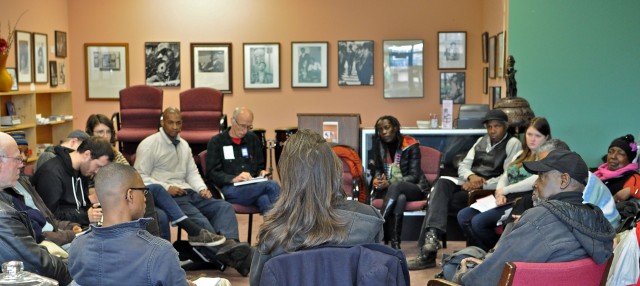By Kendall
These are sound-bites from a discussion among eighteen people who met at Reflections Coffee House and Bookstore on the morning of March 31, for the first of six discussions of Michelle Alexander’s The New Jim Crow.
“I’m appalled that people are appalled about Trayvon Martin and not about Keaton Otis. Everybody’s real concerned about racism right now, but wait a week and there’ll be a new hot topic and racism will be forgotten again. I’m here to be sure we keep on talking about racism.”
“The way I see it, the most likely place a black boy in America is going to end up is prison. We fill these for-profit prisons with cheap labor, and when these boys and men get out of prison, they can’t get jobs and they can’t get housing, and this is the box they’re in. There are more black men in prison now than there were in bondage in 1860.”
“I’m white and homeless, and I know I have privileges that black homeless people don’t have. I know a lot of white homeless people who feel they don’t have power, but they have power they don’t see. We need to have a conversation about racism in the homeless community.”
“In order for private prisons to be profitable, they have stay 90% full. One way they’re keeping them full is by moving people out of the mental health system into the prisons.”
“The war on drugs was designed to break down the radical roots that exist in black communities.”
Michelle Alexander traces how the “war on drugs” that began during Ronald Reagan’s presidency actually is an ongoing war on black communities. Alexander writes, “Like Jim Crow (and slavery), mass incarceration operates as a tightly networked system of laws, policies, customs, and institutions that operate collectively to ensure the subordinate status of a group defined largely by race.”
The book group is a way to talk about black and white experiences of race and racism; to deepen an understanding of the way the so-called “war on drugs” has created a racial caste system in the U.S.; and to explore ways to eradicate racism. It will continue meeting through April and May, Saturdays at 11 am, at Reflections Coffee House and Bookstore.








4 comments for “Reflections on “The New Jim Crow””